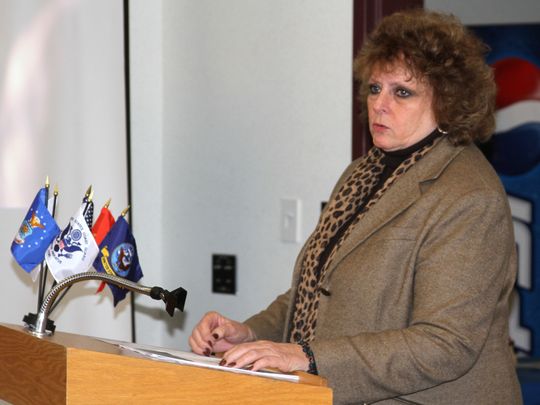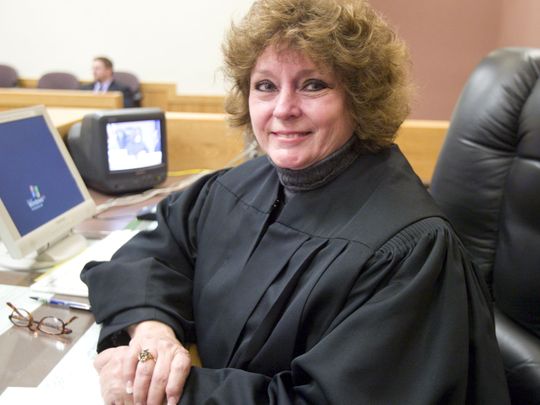|
"Veteran's Court Celebrates One Year"
December 18, 2015 The program has helped the county’s veterans reconnect with their families, and they have been able to gain and keep employment as well as improve their overall quality of life, organizers said. The county has an estimated 12,500 veterans, and about 150 have been through the jail, according to county statistics. The four-phase program takes 18 months to complete. There are requirements at each phase of the program, including reporting to probation officers and mentors, preliminary breath tests, and community service or counseling. The program began with four participants who met once a month. Today, it has expanded to two monthly meetings with 17 participants. “I expect it to double” next year, Livingston County District Judge Carol Sue Reader, who presides over the court, said at the celebration held at the Livingston County Judicial Center in Howell. Currently, the program is funded through grants. Donations also are made to the Veterans Treatment Court Foundation, which was created by Brighton attorney Neal Nielsen to assist the Livingston County Veterans' Treatment Court. [Read full article] "Foundation Receives Financial Boost Thanks to 100 Women"
July 15, 2015 County Commissioner Kate Lawrence “I was quite impressed with the work that had been done to form this court and her passion for this and, of course, our veterans,” Lawrence said. “I’m very excited about it. … Carol Sue Reader’s passion for this treatment court and her staff is just very touching to me. I’m very glad the 100 Women voted to do this and we’re excited.” [Read full article] |
|

"County Veterans Court Unveiled - 2nd Chance for Heroes"
November 19, 2014
Veterans' Treatment Court is a non-adversarial, post-sentencing program that works toward returning military veterans to a productive and law-abiding status in society. "In Michigan, 83 percent of the people who have gone through veterans' court don't reoffend; it works," District Judge Carol Sue Reader, who will preside over the court, said.
Starting the program has been a passion for Reader, who has been married to a Vietnam veteran for more than 30 years. Her husband is a Marine sniper who woke up one morning to find his buddy's throat had been slit. He was wounded three times, including once in the head, and when he came home, he and his fellow Vietnam veterans did not get a warm welcome. Reader's husband found employment with the Michigan State Police. One of his first assignments was to police area campuses where students were protesting the war effort. Reader marveled at her husband's strength in handling the situation.
"Those who serve us to preserve our freedom, they have a price they pay," the judge said. "There's no normal. We want to prevent that. We can't do anything about what happened in the past, but we can start today to make it better in the future." [Read full article]
November 19, 2014
Veterans' Treatment Court is a non-adversarial, post-sentencing program that works toward returning military veterans to a productive and law-abiding status in society. "In Michigan, 83 percent of the people who have gone through veterans' court don't reoffend; it works," District Judge Carol Sue Reader, who will preside over the court, said.
Starting the program has been a passion for Reader, who has been married to a Vietnam veteran for more than 30 years. Her husband is a Marine sniper who woke up one morning to find his buddy's throat had been slit. He was wounded three times, including once in the head, and when he came home, he and his fellow Vietnam veterans did not get a warm welcome. Reader's husband found employment with the Michigan State Police. One of his first assignments was to police area campuses where students were protesting the war effort. Reader marveled at her husband's strength in handling the situation.
"Those who serve us to preserve our freedom, they have a price they pay," the judge said. "There's no normal. We want to prevent that. We can't do anything about what happened in the past, but we can start today to make it better in the future." [Read full article]
"Help Coming for Veterans Behind Bars"
November 8, 2014
According to Department of Veterans Affairs statistics, about 20 percent of Iraq and Afghanistan veterans came home with post-traumatic stress disorder, or PTSD. Sometimes those issues lead to behavior that lands a veteran behind bars.
Livingston County District Judge Carol Sue Reader has led an initiative to create a similar court here, and she will unveil the program to county leaders at a Nov. 19 meet-and-greet event planned at the Livingston County Judicial Center in Howell. [Read full article]
November 8, 2014
According to Department of Veterans Affairs statistics, about 20 percent of Iraq and Afghanistan veterans came home with post-traumatic stress disorder, or PTSD. Sometimes those issues lead to behavior that lands a veteran behind bars.
Livingston County District Judge Carol Sue Reader has led an initiative to create a similar court here, and she will unveil the program to county leaders at a Nov. 19 meet-and-greet event planned at the Livingston County Judicial Center in Howell. [Read full article]
|
“Livingston County Court Tries Innovative Divorce Initiative”
October 28, 2009 In an effort to reduce the expense and the emotional toll often associated with divorce, an innovative program has been introduced in one Livingston County court. Gary Marsh “Judge Reader's new program is a major step forward in our mission to help serve couples and families in their moment of need.” Reader's new program of early stage mediation is a first for Livingston county, but it reflects a trend in a growing number of Michigan counties. The trend toward more affordable, more personalized and less adversarial methods for resolving disputes out-of-court is a national and international one taking hold in the field of family law. [Read full article] |
"Mentally Ill Defendants to Have Own Court"
July 10, 2009
A new court designed to better deal with the unique problems of mentally ill people facing criminal charges will begin later this month in Livingston County. Called Intensive Treatment Court, it is for non-violent offenders who are severely and persistently mentally ill, such as criminal defendants with diagnosed schizophrenia or severe bipolar disorder. "The symptoms of mental illness are it brings the person into conflict with the law, like disturbing the peace," said Livingston County Community Mental Health Executive Director Mac Miller.
Reader, who will oversee it, promised to set up the court during her 2006 election campaign and has spearheaded the process from conception to reality. The program is focusing on recovery, going back to the core problem and taking responsibility for their life so they get the proper treatment," she said. She predicted the ITC will more than pay for itself and decrease the number of repeat offenders. All six Livingston County judges have given their support to the new court. "If they have the community support and are not alone, they will recover and not return to jail," she said, stressing that the program is not a way to avoid incarceration. [Read Full Article]
July 10, 2009
A new court designed to better deal with the unique problems of mentally ill people facing criminal charges will begin later this month in Livingston County. Called Intensive Treatment Court, it is for non-violent offenders who are severely and persistently mentally ill, such as criminal defendants with diagnosed schizophrenia or severe bipolar disorder. "The symptoms of mental illness are it brings the person into conflict with the law, like disturbing the peace," said Livingston County Community Mental Health Executive Director Mac Miller.
Reader, who will oversee it, promised to set up the court during her 2006 election campaign and has spearheaded the process from conception to reality. The program is focusing on recovery, going back to the core problem and taking responsibility for their life so they get the proper treatment," she said. She predicted the ITC will more than pay for itself and decrease the number of repeat offenders. All six Livingston County judges have given their support to the new court. "If they have the community support and are not alone, they will recover and not return to jail," she said, stressing that the program is not a way to avoid incarceration. [Read Full Article]

